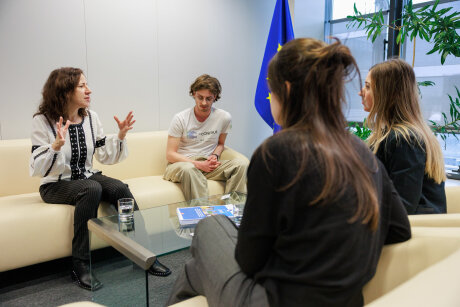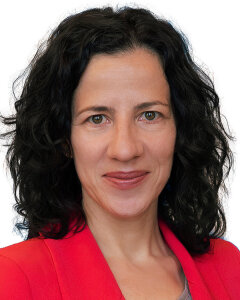Exclusive"Need of feedback to explain the European University initiative better to Member States"(R. Minzatu)
"While the European University initiative is only five years old, it is progressing well. But there is still much to do. I need inspiration and feedback from your experiences to explain the concept better to governments and member states, gain more support, and improve the funding", says Roxana Minzatu, European Executive Vice-president for Social Rights and Skills, Quality Jobs and Preparedness, to three students from European universities alliances on 24/01/2025.
This day is also an opportunity for the DGEAC to publish its “Report on the outcomes and transformational potential of the European Universities initiative”, to which News Tank will devote an article.
As part of International Education Day, the VP
Vice-president
invited Enrico Green, a student of EU-Conexus, Itziar Salazar, who graduated from Charm EU
European Union
, and Diana Radoi from Arqus, to the European Commission to share their experiences with her. News Tank was also invited to follow this exchange.
"The concept of European University is unique. What we mean by this is creating multi-campus universities where students can study, access resources, work with professors and peers from different universities, and travel while earning a degree that is European in its entirety".
The Commissioner asks the students about their studies, what the alliances offer that is different from mere mobility, what they think is the point of a European degree...
The students come back to issues of need for major logistics linked to recurrent mobility (an email address for each university, different university agendas, which can lead to overlaps, etc.) as well as the problems of housing and support in these procedures, despite financial support:
"Finding affordable accommodation in cities like Barcelona or Utrecht can be very challenging, especially without sufficient support from universities. Having a strong network of local students would help smooth these transitions", says Itziar Salazar, who studied in those two cities.
"The benefit of a unified degree platform"
Diana Radoi studies in the Joint Master’s Programme on European studies involving four universities of Arqus alliance: Granada, Vienna, Leipzig, and Graz. She is in her first year. The programme is celebrating its second anniversary this year.
"There have been some challenges, but we’re learning from them. For example, during a congress in Granada about the European degree, I realised how beneficial it would be to have a unified degree platform. Currently, we need multiple email addresses and accounts for different universities, which complicates things".
She says that "the idea of studying at multiple institutions, taking online courses with different professors, both online and in person, and interacting with students across Europe was very appealing to me. For instance, we collaborate with students from different universities on assignments. That pushes me out of my comfort zone".
"Interdisciplinary nature and emphasis on teamwork in a multicultural environment"
Itziar Salazar graduated from the first cohort of the Joint Master’s Programme in Sustainability organised by the Charm-EU alliance. When asked about how does this programme differ from a typical master’s degree by the Vice-president, she says:
"Throughout the programme, we connected with stakeholders through our professors and during our final capstone project, which focused on real-world challenges. This approach made our studies highly practical and impactful. One memorable experience was studying the course of a river and engaging with various stakeholders, including NGOs Non-Governmental Organisations , companies, and municipalities".
The interdisciplinary nature and emphasis on teamwork in a multicultural environment make it unique. We also had a strong network of professors and students from diverse backgrounds, which enriched our learning experience.
"The flexibility allows me to design my education"
Enrico Green, in the first year of his Master’s degree in Marine Biotechnology as part of the EU-Connexus alliance, started in Valencia, has moved to La Rochelle this semester, and can choose from other locations, like Croatia or Greece, next semester depending on the specialities selected.
"This flexibility allows me to design my education while benefiting from diverse climates, cultures, and teaching styles.
Additionally, the diversity of students brings unique perspectives, which fosters collaboration and teamwork in a globalised world. For instance, my cohort included students from various disciplines and nationalities. I’m interacting with students from Colombia, Nigeria, Germany, and Albania, which creates a rich learning environment".
According to Roxana Minzatu, "these alliances truly embody the European spirit of unity and diversity. They also address issues like brain drain by offering opportunities across Europe without forcing students to choose between staying in their home country or studying abroad".
Challenges and areas for improvement
Since the alliances are still in their early stages, according to Diana Radoi, there are administrative issues, like managing multiple accounts and ensuring smoother recognition of degrees. Simplifying these processes would make a big difference. Another challenge is the variation in academic calendars across countries. For example, students often have to leave one university before finishing their semester to start at another. This makes it difficult to complete assignments and meet deadlines.
Itziar Salazar explains that she had to wait for her diploma to "travel around Europe" to be signed by all the rectors of the universities involved before she could collect it.
She states: "However, I was in the first cohort of the programme, the staff and professors were very understanding and actively sought our feedback to improve the programme".
Roxana Mînzatu
Executive Vice-president for Social Rights and Skills, Quality Jobs and Preparedness @ European Commission
Visit in the directory
Career
Executive Vice-president for Social Rights and Skills, Quality Jobs and Preparedness
Romanian MEP and member of the Committee on Regional Development
State Secretary
Member of Parliament
Minister of European Funds
President
Executive Director & Project Manager
Studies & Diploma
Public Leadership Credential, Public Policy Analysis
Master's degree, European Integration
Bachelor's degree, Political Science and Government
# 52318, created on 17/09/24 at 11:37 - Updated on 26/11/25 at 11:20


